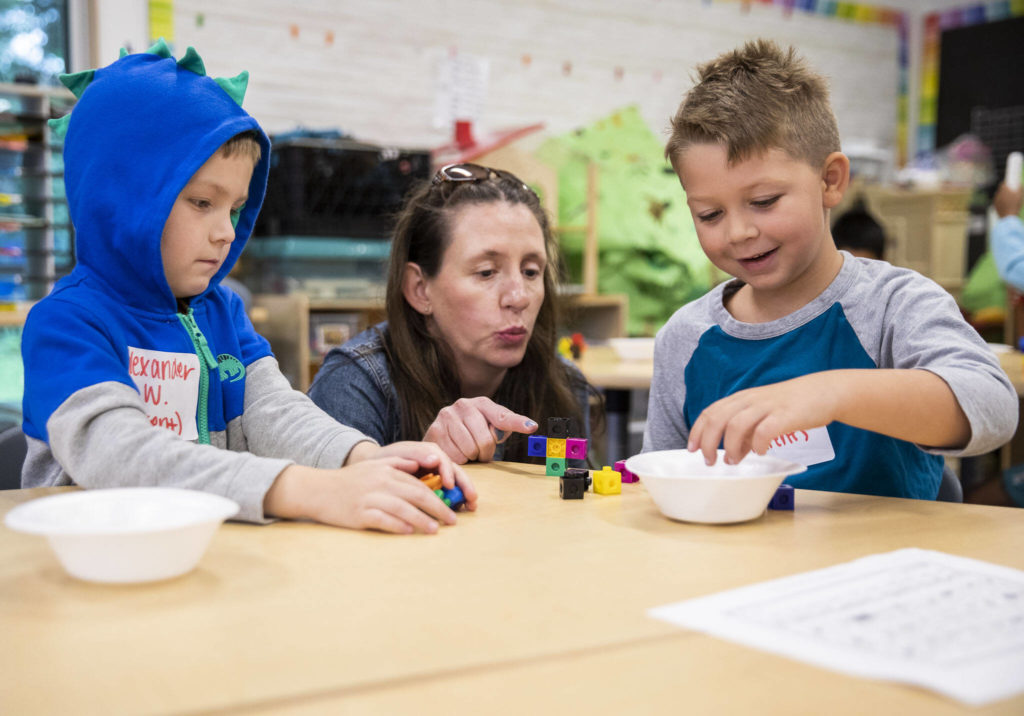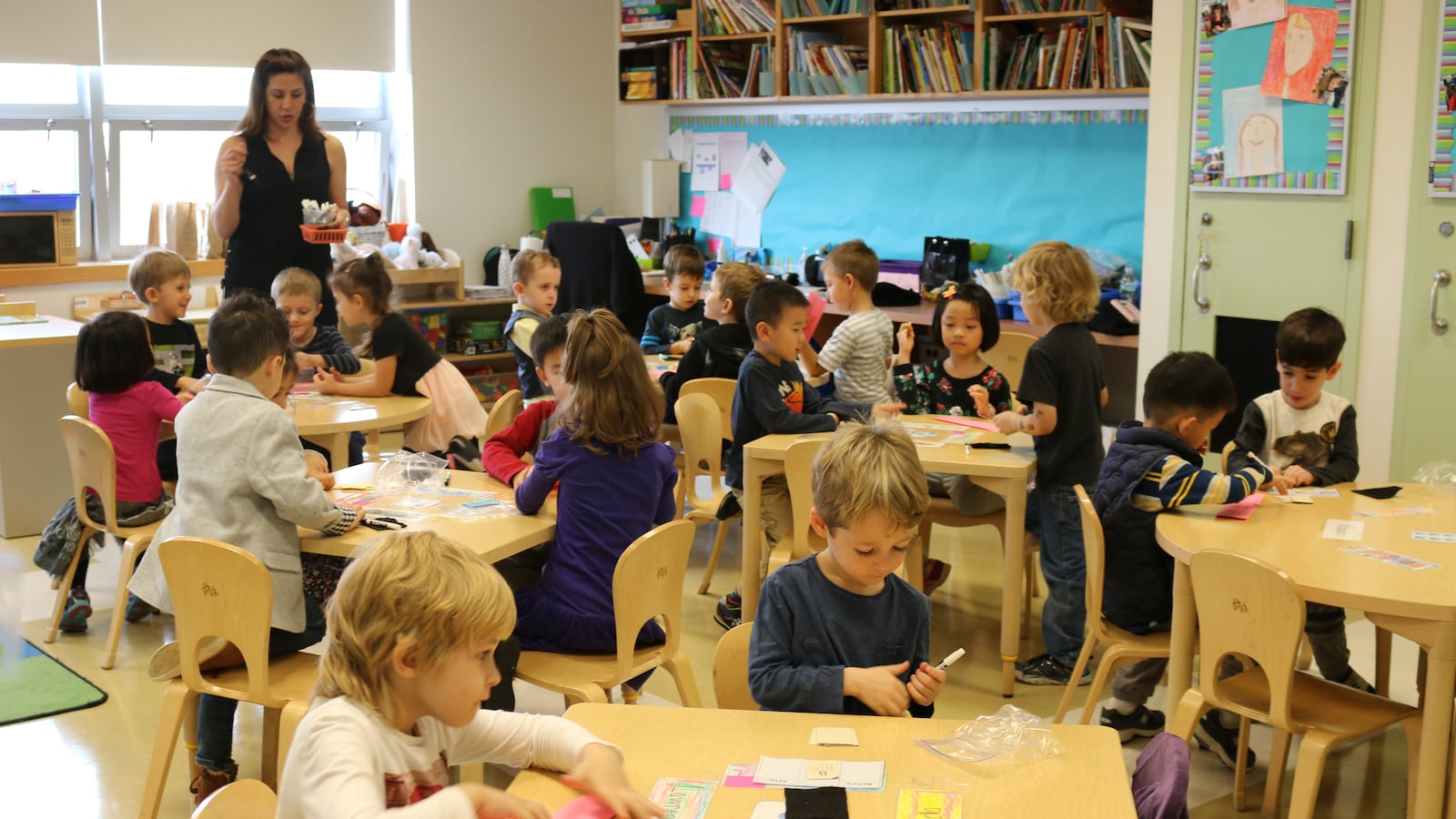Interactive technology that enhances student learning at Private Grade School Peoria
Wiki Article
The Significance of Interactive Tasks in Quality College Education And Learning
Interactive tasks play a vital role in elementary school education and learning. They engage trainees and improve finding out end results. Via group tasks and hands-on experiments, pupils experience the material in a useful means. This technique deals with varied knowing designs and promotes crucial skills. The advantages extend beyond academics. Exploring the deeper influence of these activities discloses their value in shaping young learners' futures. What changes take place when pupils proactively get involved?Enhancing Engagement With Interactive Knowing
Typical training methods have their merits, interactive knowing greatly improves trainee engagement in quality school education and learning. This strategy motivates energetic participation, allowing students to submerse themselves in the discovering process. By using team tasks, hands-on experiments, and technology-driven resources, educators create an atmosphere where pupils feel more attached to the material.Interactive discovering facilitates cooperation amongst peers, promoting interaction skills and synergy. It additionally accommodates diverse understanding styles, guaranteeing that visual, acoustic, and kinesthetic students can all grow. Additionally, students are most likely to preserve info when they proactively participate, instead of passively receiving understanding.
This dynamic method not only makes finding out enjoyable however likewise imparts a feeling of ownership in trainees regarding their instructional journey. As they involve with the material, their curiosity and inspiration to learn boost, laying a strong foundation for future scholastic success.
Creating Essential Thinking Skills
Interactive understanding not just enhances involvement yet likewise works as a catalyst for developing vital believing abilities in elementary school students. Through tasks such as problem-based learning, disputes, and hands-on experiments, trainees are motivated to assess details, review different viewpoints, and create reasoned conclusions. These interactive experiences need trainees to doubt presumptions, leading them to believe more deeply regarding different topics.
Interactive activities often present real-world scenarios that challenge trainees to use their expertise creatively. By navigating via these obstacles, they find out to recognize pertinent details and make notified decisions. This procedure promotes not only specific essential thinking but additionally urges students to express their assumed procedures, boosting their capability to interact successfully. Because of this, interactive discovering environments grow a generation of vital thinkers who are better prepared to tackle complex issues in their future academic and expert endeavors.
Cultivating Cooperation Amongst Peers
Cultivating cooperation amongst peers is essential in elementary school education and learning, as it enhances synergy and interaction skills. Participating in team activities helps pupils develop trust and respect for one another, preparing for effective cooperation. Furthermore, analytic together permits students to pick up from each various other and create a cumulative approach to difficulties.Synergy and Communication Abilities
Reliable team effort and communication abilities are necessary parts of a successful elementary school education and learning. Participating in interactive activities motivates pupils to collaborate, share concepts, and fix problems together. Such experiences advertise the growth of vital interaction abilities, allowing youngsters to share their ideas plainly and pay attention proactively to others. Through teamwork, trainees discover to appreciate diverse perspectives, cultivating a sense of area and shared obligation. Structured team jobs, whether in academics or innovative tasks, enhance peer communications, educating children how to negotiate functions and resolve disputes. These skills not just add to a positive classroom setting yet also prepare trainees for future collaborative ventures in higher education and the office. Generally, team effort and communication are foundational to all natural advancement in elementary school.Structure Trust Fund and Respect
Building trust fund and regard among peers works as a keystone for effective cooperation in quality college settings. They are a lot more most likely to involve actively in group activities when students really feel valued and appreciated by their classmates. Interactive activities, such as group projects and participating games, supply chances for pupils to gain from one an additional, fostering a feeling of community. This environment motivates open communication, permitting students to express their concepts and opinions without concern of judgment. As depend on develops, pupils come to be more ready to share obligations and support each other's knowing. Inevitably, cultivating an atmosphere of count on and respect boosts not only scholastic outcomes yet also social advancement, outfitting students with vital social skills for their future ventures.Problem-Solving Together
Collaborative problem-solving involves students in important thinking and team effort, crucial skills for their scholastic and individual growth. When trainees interact to deal with obstacles, they learn to connect efficiently, respect diverse point of views, and utilize each other's staminas. This process improves their ability to evaluate issues from numerous angles and develop innovative options. Team activities, such as science experiments or mathematics challenges, promote energetic involvement and foster a feeling of neighborhood. As students collaborate, they also develop social abilities, finding out to compromise and work out, which are vital for future communications. Inevitably, problem-solving together cultivates an encouraging discovering environment, encouraging students to take possession of their education and learning while preparing them for collaborative ventures past the classroom.Motivating Creative Thinking and Advancement
Urging creativity original site and technology in elementary school education can be substantially enhanced with hands-on learning experiences. These tasks enable students to involve straight with materials and concepts, promoting imaginative reasoning. In addition, collaborative group tasks can promote diverse ideas and options, additionally supporting a creative environment.Hands-On Knowing Experiences
A multitude of hands-on understanding experiences substantially improves creative thinking and technology in quality institution education. Engaging students in practical activities enables them to use theoretical understanding in real-world contexts, promoting much deeper understanding. By controling devices and products, kids establish essential analytical skills and learn to think outside the box. These experiences motivate interest and encourage students to discover their interests additionally. In addition, hands-on activities can bridge various subjects, linking scientific research, art, and math in meaningful means. This interdisciplinary technique urges students to see connections and think artistically. Eventually, hands-on learning experiences nurture a generation of pioneers, equipping them with the abilities and self-confidence needed to take on future obstacles and add to culture in unique ways.Collaborative Team Projects
Hands-on understanding experiences normally lead to the consolidation of collective group tasks, which play a vital role in cultivating creative thinking and development in grade institution education and learning. These tasks urge pupils to interact, sharing ideas and perspectives, which enhances problem-solving abilities and vital reasoning. Via cooperation, trainees learn to connect effectively and regard diverse point of views, essential skills for their future. Additionally, group jobs supply chances for pupils to trying out various roles, increasing their adaptability and confidence. Taking part in this navigate to this site cooperative atmosphere allows them to discover their imagination, pushing the limits of standard learning. Eventually, collaborative group tasks not just enhance the educational experience but additionally prepare students for real-world challenges that need teamwork and cutting-edge thinking.Structure Confidence and Self-reliance
As students participate in interactive activities, they commonly find chances to construct confidence and freedom. These tasks, whether they entail hands-on projects, role-playing, or analytical jobs, motivate pupils to take effort and express their concepts openly. By getting involved in such experiences, trainees discover to trust their abilities and have a peek at this site choose without counting only on guidance from teachers or peers.In addition, interactive activities foster a sense of possession over knowing. When students tackle challenges collaboratively or individually, they create critical assuming abilities and durability. This process not only improves their understanding of the subject but likewise empowers them to take dangers in their learning journey.
As they navigate numerous interactive situations, students progressively shed their self-doubt, paving the method for enhanced self-confidence - Private School. Inevitably, these tasks play a necessary role in nurturing independent and certain learners, furnished to face future academic and personal challenges
Producing a Positive Class Setting
While cultivating a positive class atmosphere is vital for efficient knowing, it needs intentional initiative from instructors to produce a room where students feel secure, highly regarded, and involved. A favorable ambience motivates partnership, enabling students to share themselves without worry of judgment.Educators can achieve this by developing clear assumptions, promoting mutual regard, and identifying private payments. Including interactive activities better boosts engagement, making finding out more vibrant and satisfying.
In addition, a nurturing atmosphere supports social-emotional development, as students discover to navigate connections and resolve problems. Teachers play a vital duty in modeling favorable habits and enhancing a society of kindness and inclusivity.
Frequently Asked Questions

Exactly How Can Parents Support Interactive Learning in the house?
Parents can support interactive knowing in your home by giving appealing materials, motivating hands-on projects, including academic games, cultivating conversations, and creating a nurturing atmosphere that advertises interest and expedition in their kids's learning experiences. (Kindergarten)What Types of Interactive Tasks Are A Lot Of Efficient?
Hands-on jobs, collaborative games, role-playing scenarios, and educational technology applications are among the most reliable interactive activities. These engage students, enhance important assuming abilities, and advertise team effort, eventually cultivating a deeper understanding of various subjects.How Do Interactive Activities Satisfy Various Knowing Styles?
Interactive tasks involve aesthetic, acoustic, and kinesthetic learners by integrating varied methods. These tasks help with understanding through hands-on experiences, collaborative conversations, and visual help, permitting trainees to take in details according to their recommended discovering style.What Are the Costs Linked With Implementing Interactive Tasks?

Applying interactive activities incurs expenses such as products, training for instructors, innovation upgrades, and possible facility modifications. Budget restraints can additionally impact the frequency and variety of activities used to students in educational setups.
How Can Teachers Analyze the Influence of Interactive Discovering?
Educators can analyze the influence of interactive knowing through observations, student feedback, performance metrics, and comparative evaluation of examination scores before and after execution, guaranteeing a complete understanding of involvement and expertise retention renovations.Via activities such as problem-based understanding, disputes, and hands-on experiments, students are motivated to evaluate information, review various viewpoints, and create reasoned final thoughts. Interactive activities commonly existing real-world situations that challenge pupils to apply their knowledge creatively. Involving in interactive tasks urges pupils to team up, share ideas, and address issues together. Interactive tasks, such as group tasks and cooperative video games, supply chances for trainees to discover from one another, fostering a feeling of neighborhood. As trainees engage in interactive activities, they commonly discover opportunities to develop confidence and independence.
Report this wiki page